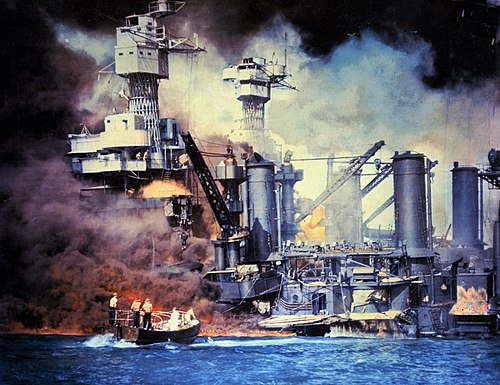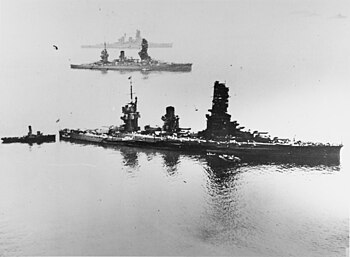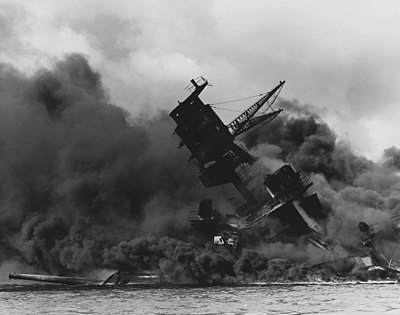 |
| Pearl Harbor before the attack |
On National Pearl Harbor Remembrance Day, we honor the more than 3,500 Americans killed or wounded during that deadly attack and pay tribute to the heroes whose courage ensured our Nation would recover from this vicious blow. Their tenacity helped define the Greatest Generation and their valor fortified all who served during World War II. As a Nation, we look to December 7, 1941, to draw strength from the example set by these patriots and to honor all who have sacrificed for our freedoms.
 |
| West Virginia sinking |
Hitler’s policy before and during WW2 was “one at a time.” He would only attack one nation at a time, thus preventing other nations from banding together with them. In this way he was able to easily defeat nations that would have been much more difficult if they had been able to band together. This was what he did to the United States. Eventually he would have attacked them, but he did not want to declare war on them until he had defeated the British Empire and the Soviet Union. Since the US Constitution requires that the President get the Congress to declare war, President Roosevelt was not able to get the Congress to declare war on the Axis until they were actually attacked. Even though they were supposed to be neutral, the USA still helped the British massively by giving them huge amounts of munitions. Germany, however, just ignored this because they did not want to fight the United States until they were done with Britain and the Soviet Union. As Churchill said, “[Hitler] always dreaded the consequences of war with the United States, and insisted that German forces should avoid provocative action.”2
 |
| Japanese battleships |
But then in 1941 Japan decided that the Axis was going to win the war, so they wanted to join on their side. Japan’s targets were the eastern holdings of Britain, the Netherlands and also the United States. Japan decided that it needed to strike the United States pacific fleet stationed in Pearl Harbor so that they would not be able to resist Japanese conquests. They wrongly thought that if they attacked Britain’s colonies in the east the American fleet would attack them. This would probably not have happened. Hitler disagreed with Japan’s decision to attack the US. He thought that they should first attack and capture the British and Dutch colonies, then attack the United States. “[Germany] urged the Japanese Government to strike without delay at Malaya and Singapore and not to bother about the United States. Hitler had already enough on his shoulders without drawing them in.”3 Winston Churchill, the leader of the English Empire said, “My deepest fear was that the Japanese would attack us or the Dutch, and that constitutional difficulties would prevent the United States from declaring war.”4
Compared to the United States, Japan was nothing. Bringing in Japan on their side and the United States on the other would hurt the Axis greatly. Japan was temporarily in a better position because they were ready for war and closer to where the battles would be fought, but ultimately their strength was not even close to America’s. Churchill said this before Japan attacked,
Viewing the vast, sombre scene as dispassionately as possible, it would seem a very hazardous adventure for the Japanese people to plunge quite needlessly into a world struggle in which they may well find themselves opposed in the Pacific by States whose populations comprise nearly three-quarters of the human race. If steel is the basic foundation of modern war, it would be rather dangerous for a Power like Japan, whose steel production is only about seven million tons a year, to provoke quite gratuitously a struggle with the United states, whose steel production is now about ninety millions; and this would take no account of the powerful contribution which the British Empire can make.5
The Japanese did not listen to Hitler, and continued to prepare their attack on Pearl Harbor. They struck without warning on December 7th, 1941. Their attack was mostly successful. Four American battleships were sunk, the other four were disabled. Almost 200 aircraft were destroyed, and 150 more damaged. But even though America’s navy was severally damaged, it still had many more resources than the Japanese. After the attack Germany, Japan and Italy declared war on the United States; Britain declared war on Japan and the United States declared war on Japan, Germany and Italy.
 |
| Japanese Planes attack Pearl Harbor |
[N]ow at this very moment I knew the United States was in the war, up to the neck and in to the death. So we had won after all! … We had won the war. England would live; Britain would live; the Commonwealth of Nations and the Empire would live. How long the war would last or in what fashion it would end no man could tell, nor did I at this moment care. … Hitler’s fate was sealed. Mussolini’s fate was sealed. As for the Japanese, they would be ground to powder. All the rest was merely the proper application of overwhelming force. The British Empire, the Soviet Union, and now the United States, … were, according to my lights, twice or even thrice the force of their antagonists. No doubt it would take a long time. … [B]ut all this would be merely a passing phase. United we could subdue everybody else in the world. May disasters, immeasurable cost and tribulation lay ahead, but there was no more doubt about the end.6Winston Churchill turned out to be correct. The Axis was not able to defeat the combined strength of the United States, Great Britain and the Soviet Union. Japan’s attack on the United States combined with Germany’s failed attack on Russia destroyed the Axis’ chances for final victory.
 |
| USS Arizona burns after the Japanese attack on Pearl Harbor |
2 Churchill, Winston. The Second World War. (London: Cassell & Co. Ltd 1948) volume 3, p. 126
3 Ibid, p. 1604 Ibid, p. 5345 Ibid, p. 528-5296 Ibid, p. 539-540
3 Ibid, p. 1604 Ibid, p. 5345 Ibid, p. 528-5296 Ibid, p. 539-540






0 comments:
Post a Comment